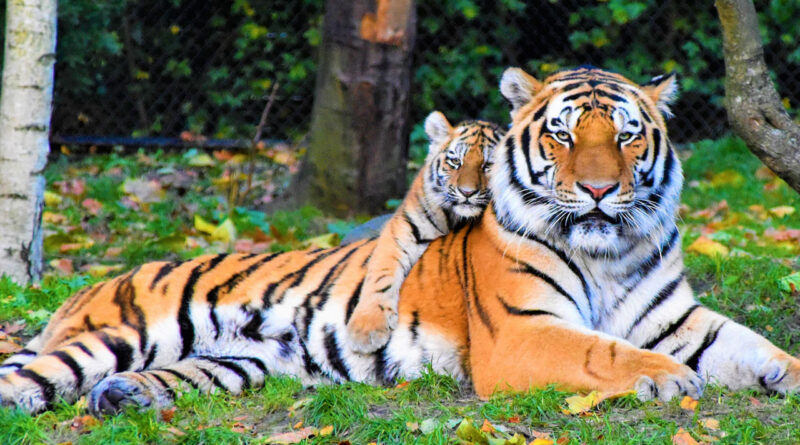Tiger Numbers on the UP . . .
Most of the time, these days, when we talk about wildlife and the environment, the story seems to end up in a negative vibe about how we as a species are doing the wrong thing and that we are killing our own planet and all the living creatures on it. Although this is unfortunately true in too many cases, there are positives, some success stories. And the Tiger story is one of them. You may have seen the headlines that read: BBC – “India’s Tiger population sees 30% increase” and other news sources that tell of the first increase in World Tigers numbers in 100 years.
This is such awesome news!
Tigers are an incredible animal and certainly one of the most recognisable species on the planet. I’d go as far as to say its one of the first animals we humans learn the name of which I think is quite a powerful thing. Tigers are still considered critically endangered and if the numbers had gone the other way, as in a 30% decrease, we could all but say goodbye to these amazing cats in the wild (considering their numbers were around 3000 individuals). That would mean that a region where most of the world population (Asia) has lost one of its most iconic species…. But alas its looking good for the tiger and the target to double the number of tigers in the wild by 2022 (the next Chinese year of the tiger) set in 2010 by governments of the 13 tiger range countries is looking promising.
QUICK FACTS
Numbers in the Wild 100 Years Ago – Est. 100,000
Numbers in the Wild in 2016 – Est 3890 (up from 3200 in 2010)
Tigers are the largest cats on the planet
There are 5 of the remaining 7 subspecies of tigers living in approx 6% of their remaining tiger habitat
Countries where Tigers are found Bangladesh, Bhutan, Cambodia, China, India, Indonesia, Laos, Malaysia, Myanmar, Nepal, Russia, Thailand & Vietnam
How YOU can HELP TIGERS
1. Refuse any tiger products eg things that contain Tiger Bone, tiger penis etc. Used in traditional medicine. Mainly prevalent in Asian countries (China, Japan and Korea to name a few), if you are travelling to Asia, keep this is mind when ordering your foods or medicines if you require them. Although you’ll most likely know if you are getting tiger products because it is not cheap. In Taiwan Tiger penis soup costs – $320USD and in Soeul – Powdered Tiger Bone costs $1450lbs. Worth being aware of. Also worth asking your Traditional Medicine practitioner if they use any of these products in their treatments. Although this may insult them, its worth asking the question. Or asking their knowledge of the use of these products if you don’t feel comfortable asking them outright.
Tiger Safari
Known Tiger of Ranthambapore NP
2. Go and see tigers either in the wild – or at a zoo or sanctuary. If the organisation is reputable, some of money you pay for the experience to see these animals will go back into tiger conservation. And any money is better than spending no money. Seeing these creatures up close and personal is a truly magnificent experience and one you wont forget. (see later my post on visiting tigers in Ranthambapore NP in India – one of my most top wildlife encounters!)
Getting up close and personal with Tigers is a special moment
3. Ask your Government to Label Products that use Palm Oil – Palm Oil and the issues surrounding it is a huge topic that I will be exploring in not to distant future post however in the meantime just know that certain areas of Tiger habitat in South East Asia are being removed illegally to make way for Palm Oil. We, as consumers, eat palm oil unsuspectingly in a lot of products on the supermarket shelves. Some Palm Oil is Certified Sustainable Palm Oil (CSPO) and doesn’t have an impact on Tiger habitat however there is a lot of Palm Oil that isn’t. At the moment its hard to know if the products we buy have palm oil in them, let alone if it is sustainably grown or not. If you support campaigns such as the “Don’t Palm Us Off Campaign” at the Melbourne Zoo (http://www.zoo.org.au/get-involved/act-for-wildlife/dont-palm-us-off) then you can put pressure on governments to ensure that Palm Oil is labelled on products. This way we can have a conscious choice whether we choose that product or not…. More to come on this in near future.
Dont Palm Us Off
Melbourne Zoo Campaign Helping Tigers, Orangutans and other animals affected by habitat loss from Palm Oil plantations.
4. Donate – giving money towards tiger conservation through adopting an animal (WWF and many other organisations offer these programs) will give you great satisfaction in knowing you are contributing to the survival of these amazing animals…




